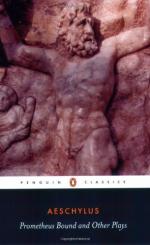|
This section contains 671 words (approx. 2 pages at 400 words per page) |

|
When Aeschylus was born in 525 B.C. outside Athens, the city could be characterized as an unimportant polis (i.e. city-state) ruled by the tyrant Hippias. In 510 B.C., a political reformer, Clisthenes, overthrew the tyrant and developed the government into a republic ruled democratically by the elite. Reforms lessened the power of the nobility and allowed non-noble landowners to participate in government. Though conflicts between the nobility and commoners (known as the demos, hence the word democracy) remained, Athens developed into a well governed city-state led by a vital, informed citizenry.
Those citizens proved to be competent soldiers as well and fought bravely against invasion by the Persian empire. Athens and the Greeks defeated the Persians, winning land and sea victories at Marathon (490 B.C.) and Salamis (480 B.C.), respectively, against numerically superior forces.
Athens' s victorious role in the Persian wars led to its...
|
This section contains 671 words (approx. 2 pages at 400 words per page) |

|




